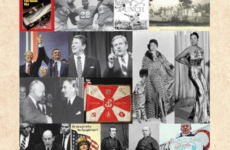By: Maggie Kelly | Staff Writer
As young girls, we are taught to see each other as competition, and often, as enemies. Where is that taught? Is it from the older women in our life? The media? Tara Brooke Watkins, Salve’s Theater Program director, thinks it comes from the church.
When I spoke to her, Watkins discussed how she came up with the concept. Earlier in her life, while attempting to put on a play that contained discussions of incest, she was questioned by religious authority figures. They explained that they didn’t want young women to be influenced by the scenes, and ultimately the play was stopped. Later in life, Watkins asked herself a question: “Am I alone in this world as a woman?” From these thoughts, she decided to hold story-circles, in which volunteers would read Bible passages and discuss how they could relate to the characters. From these discoveries, she came up with a spectacular play idea, which takes shape in The Bible Women’s Project. Watkins has done this show several times, with many different groups of actors. Every time, the script changes and the stories being shared are different. This year, she decided that it was the right time for Salve to perform it in our own chapel.
“I just want to be heard.” This plea forms the foundation of the show, and it is recited in the opening minutes of the production. Eleven girls circle the middle of the chapel, facing the audience. They all wear similar black clothing. Later, Watkins explained to me that the costume choice was derived from the actor’s own daily style, in order to mutually express individuality and solidarity. The first story told is one that many are familiar with, Eve.
As a child, I wasn’t raised religiously. However, I do know the story of Eve. I can remember being taught that she was the villain, a woman to avoid and shame. In the play, her story is told with echoes of childhood on the playground, recalling Watkins’ theory of competition between young girls being taught in church. Eve is relentlessly bullied by the other girls as she is wrapped in a red cord, which will follow through the other women’s stories in the play. To tell these stories, the cast doesn’t simply recite Scripture to their audience. Instead, they use songs, dancing, and even jokes. However, there is a constant undercurrent of sadness and rage, even in the funniest sections of the show. These women went through intense trauma and challenges, and in every story, they are unfairly shamed by others.

As an audience member, it is easy to lose yourself in the anger of the stories. However, not every tale is filled with cruelty. My personal favorites were the stories that discussed female relationships. Mary and Martha, sisters, challenged Jesus to fix his mistake, and surprisingly, he listened to them with respect. Naomi and Ruth took care of each other even when their responsibility as mother and daughter-in–law was eliminated. Elizabeth discusses how her fear and sadness was only quelled when Mary visited her. While the play showed how women can be torn down, it also showed how they can lift each other up.
In the end, the cast returns to the story of Eve. She begs the audience for understanding, and it seems that we can finally offer some. Eve wasn’t a villain, she was simply a woman who was curious. How could we blame her when we have all been tempted by the same? Like Eve, the power of understanding spread to the other women that have been discussed. As the actor’s tell their own stories, they become intertwined with the Bible women, and therefore, with every woman who can relate to them. Rizpah shows the power of a mother’s love. Leah speaks about the competition between women, and how desperate we can become to be perceived as “better.” Elizabeth explains how she was shamed for her inability to have children, and later, her lack of desire to have them. All of these stories are important, because they are experienced by women every day. The play excellently shows how these challenges have followed women around for centuries, and likely will continue unless we learn to talk about them without shame.
The most memorable part of this play, in my opinion, was the reactions of the audience. After the show ended, Watkins opened up a conversation space for anyone who wanted to ask questions or simply express how they felt. As I listened to those speaking, I took the opportunity to glance at the faces surrounding me. An elderly woman about two pews ahead of me immediately stood out. She sat silent and still as tears trickled down her face. Other women held similar expressions. As though even if they hadn’t spoken, they had finally been heard.
That is the power of The Bible Women’s Project. I implore any who have the opportunity to go and see the show to take advantage. When we talked, Watkins also mentioned that the show is being considered for selection in the Kennedy Center American College Theatre Festival in 2023. This is an extraordinary accomplishment, and I can think of no better show to be featured in such an event. I personally look forward to watching this show’s progress, and would like to extend my own congratulations to the cast and crew for their excellent work and performance.
Photos by Tara Brooke Watkins














